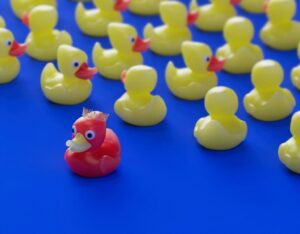How to become a proofreader? If you’re a stickler for details and have a sharp eye for spotting errors, then proofreading might be the perfect career for you. Proofreaders play an important role in the publishing industry, ensuring that books, magazines, and other print materials are free of errors before they go to print. But how do you become a proofreader?

Here are a Few Things to Keep in Mind:
- You’ll need excellent language skills. You should be able to identify misspellings, grammatical errors, and typos with ease. In addition, it helps to have some knowledge of different style guides, such as The Chicago Manual of Style or The Associated Press Stylebook.
- You’ll need to be patient and detail-oriented. Proofreading can be a tedious task, so you must be able to focus and not let small errors slip through the cracks.
- It’s helpful to have some experience working with publishing software, such as Adobe InDesign or Quark Express. While not required, this knowledge can give you an extra edge when applying for proofreading jobs.
What is a Proofreader and What do they do
Proofreaders are the last line of defense against errors in a text before it goes out into the world. They comb through a text looking for typos, misspellings, grammatical errors, and inconsistencies. In some cases, they may also make suggestions for improving clarity or style. Proofreaders play an important role in ensuring that a text is error-free and ready for publication.
While anyone can proofread their work, it’s often helpful to have another set of eyes to catch errors that you may have missed. That’s where professional proofreaders come in. They come with fresh eyes and can often spot errors that you’ve become blind to. In addition, they can help to ensure that your text is consistent and flows well. If you’re preparing a text for publication, it’s well worth hiring a professional proofreader to give it a once-over.
The Skills Required to be a Successful Proofreader
To be a successful proofreader, you need to have an eagle eye for detail and the ability to spot even the smallest errors. You also need to be able to read quickly and efficiently, so that you can identify mistakes without disrupting the flow of the text. In addition, it is helpful to be familiar with the style guide of the publication you are working on so that you can ensure that all of the text adheres to the same standards.
Proofreading is a vital part of the publishing process, and it takes a skilled professional to do it well. With practice and patience, anyone can develop the necessary skills to become a successful proofreader.
What Type of Person makes a Good Proofreader
Proofreaders are a special breed. They’re the people who catch all the typos, the misplaced commas, and the grammatical errors that can slip through even the most careful writer‘s net. But being a good proofreader isn’t just about having an eye for detail. It’s also about knowing how to effectively communicate corrections and suggestions in a way that doesn’t come across as overly critical.
After all, nobody likes being told that their work is full of mistakes. The best proofreaders can give constructive feedback without coming across as judgmental or condescending. So, if you’re looking for a career in proofreading, be sure to brush up on your people skills as well as your attention to detail.
How to become a Proofreader
If you’re serious about becoming a proofreader, there are a few things you’ll need to do:
- You’ll need to hone your skills. Pay attention to the details in everything you read, and learn to spot errors quickly.
- You’ll need to develop a thick skin. Not everyone will appreciate your corrections, but it’s important to be professional and polite.
- You’ll need to build up a list of clients. Start by offering your services to family and friends, and then branch out to businesses and organizations.
With hard work and dedication, you can become a successful proofreader.

What are the Benefits of being a Proofreader
There are a lot of talks these days about the importance of content marketing. And it’s true: in a world where anyone can publish anything, the ability to produce quality content is more important than ever. But there’s another important piece of the puzzle that often gets forgotten: quality control. To be a successful content marketer, you need to be able to produce not only great ideas but also error-free copy. And that’s where proofreading comes in.
Proofreading is the process of checking a piece of writing for errors before it is published. It’s an essential step in the content marketing process and one that should never be skipped. After all, even the best ideas can be undermined by poor spelling or grammar.
So what are the benefits of being a proofreader?
- It’s a great improve your writing skills. As you proofread other people’s work, you’ll learn to spot errors more quickly and easily, and you’ll develop a better eye for detail.
- It’s a great way to make some extra money. If you’re a freelance writer or editor, offering proofreading services is a great way to diversify your income stream.
So if you’re looking for a way to make sure your content is top-notch, consider adding proofreading to your list of skills. It could just be the edge you need to succeed in today’s competitive digital landscape.
Proofreading Tips for Beginners
The reason that editing and proofreading are important is that the last thing you want is for a potential customer or client to come across a typo or grammatical error in your marketing materials. It not only reflects poorly on you and your business, but it also makes you look unprofessional. Even if you’re just starting, it’s important to take the time to proofread your work before you publish it.
Here are a few tips to help you get started:
- Read your text out loud. This will help you to catch errors that you might otherwise miss.
- Ask someone else to read through your work. It’s always helpful to have another set of eyes on your writing.
- Use spell check, but don’t rely on it entirely. Spell check won’t catch everything, so it’s important to proofread manually as well.
- Take your time. Don’t try to rush through the proofreading process. The more time you take, the more likely you are to catch errors.
By following these tips, you can help ensure that your writing is error-free. Remember, attention to detail is crucial when it comes to making a good impression on potential customers and clients.

The Best ways to Improve your Proofreading Skills
Here are three tips to improve your proofreading skills:
- Develop a system for proofreading your work. Whether it’s reading your work aloud or using a specific set of editing symbols, find a method that works for you and stick to it.
- Take your time. Rushing through the proofreading process will only lead to more mistakes. Slow down and take the time to carefully check for errors.
- Use resources. Several excellent books and websites can help you learn how to proofread more effectively. Take advantage of these resources and brush up on your skills.
By following these tips, you can develop more effective proofreading habits and improve the quality of your writing.
Conclusion
Proofreading is an important part of the content marketing process. It’s essential for producing error-free copy and making a good impression on potential customers and clients. To become a successful proofreader, it’s important to develop the right skills and temperament. With practice and dedication, anyone can learn how to proofread effectively.
FAQs
Q: What type of person makes a good proofreader?
A: A good proofreader is someone who has an eye for detail, excellent concentration and problem-solving skills, and a knack for catching typos. They should be patient, organized, and well-versed in grammar rules. Additionally, they must have strong communication skills as they will often need to work with other professionals on projects.
Q: What are the benefits of becoming a proofreader?
A: Proofreading can be an incredibly rewarding job; it allows you to use your skills to make sure that written materials are error-free before they are published. Plus, since many companies are now outsourcing their editing needs, this can be a great way to make extra money while working from home.
Q: How can I become a proofreader?
A: To become a successful proofreader, it is important to have strong knowledge of grammar rules, as well as an eye for detail. You should also brush up on your spelling and punctuation skills, and look into taking any relevant classes or workshops that will give you more practice in the field. Additionally, employers often require that you pass certain tests or exams before hiring so make sure you are prepared for those too.
Q: What type of work can I expect to do as a proofreader?
A: As a proofreader, you can typically expect to review manuscripts, books, websites, advertisements, and other written material to ensure accuracy and correct any errors. You may also be required to give feedback to the author or editor about their work, so excellent communication skills are a must.
Additionally, proofreaders often have deadlines to meet, so it is important that you stay organized and on task to complete projects promptly.
Q: Do you have any tips for beginning proofreaders?
A: As with any new job, there will be a learning curve when it comes to becoming a successful proofreader. To get started, practice your grammar and punctuation skills by reading books and articles related to editing. Additionally, look into joining online forums or communities where proofreaders can share tips and advice. Finally, take the time to find resources that can help you stay up-to-date on current trends and best practices in the industry. This will ensure that you are always providing top-quality work to your clients.





